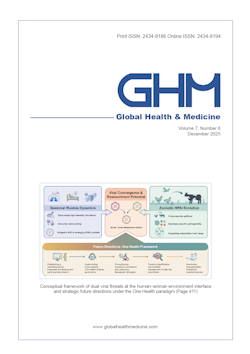Global Health & Medicine 2022;4(3):146-151.
Possible association of HLA-DP polymorphism and antiretroviral therapy with hepatitis B virus clearance in an HIV-infected Vietnamese population
Mizushima D, Hayashida T, Nguyen DHT, Nguyen DT, Matsumoto S, Tanuma J, Gatanaga H, Nguyen KV, Oka S
There is little evidence regarding the association between hepatitis B virus (HBV) chronicity and HLA-DP among the HIV-infected Vietnamese population. To study this, we conducted a cross-sectional analysis and a prospective study involving an HIV-infected Vietnamese cohort. The association between HBV chronicity and HLA-DP single nucleotide polymorphisms (SNPs) of rs3077 and rs9277535 among Vietnamese patients with previous HBV exposure was first evaluated. In addition, treatment-naive patients with chronic HBV infection were followed between 2012 and 2017 for HBV clearance after the initiation of antiretroviral therapy (ART). A total of 820 subjects with previous HBV exposure were included in the cross-sectional study. Among them, 147 (17.9 %) had chronic HBV infection, and 673 (82.1 %) achieved HBV clearance. The proportions of minor allele homozygotes of rs3077 and rs9277535 were 10.9 % and 15.2 % (p = 0.481) and 4.1 % and 11.7 % (p = 0.003), respectively. Multivariate analysis showed that rs9277535 minor homozygote was a significant protective factor against chronic HBV infection (odds ratio [OR], 0.271; 95 % confidence interval [CI]; 0.114-0.642, p = 0.001). Further, none of the 43 patients in the prospective study, who received ART possessed the rs9277535 minor homozygote. The average follow-up period was 4.8 years, and 10 subjects (23.3 %, 4.9 %/person-years) achieved HBV clearance. Univariate analysis revealed that the SNPs were not significantly associated with HBV clearance. In conclusion, our study confirmed that the rs9277535 minor allele homozygote was significantly associated with HBV clearance among HIV-infected Vietnamese patients.
DOI: 10.35772/ghm.2021.01113







